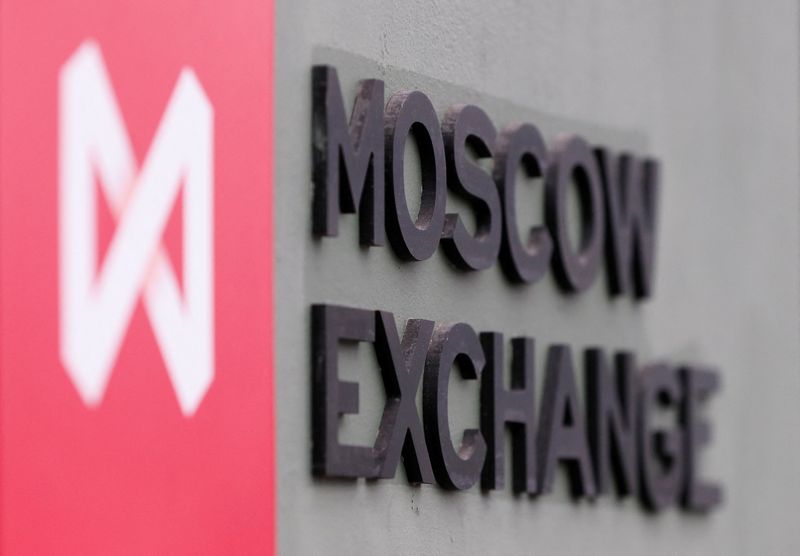By Katya Golubkova
MOSCOW (Reuters) - Russian assets are under pressure as investors worry about the possible extension of U.S. sanctions or new EU measures targeting officials, banks and the energy sector if Moscow attacks Ukraine - a move Russia denies it is planning.
The Russian stock market has lost around 20% since hitting record highs in October, the rouble has fallen to a more than eight-month low and yields on Russia's 10-year benchmark OFZ state bonds spiked to their highest in nearly six years in January.
On Friday morning, Russian assets were down again, as the markets await a meeting between U.S. Secretary of State Antony Blinken and Russian Foreign Minister Sergei Lavrov in Geneva later the day.
Despite the dangerous geopolitics, Russian officials say economic fundamentals are strong and say the rouble volatility is temporary.
How healthy are Russia's finances and what might authorities do to calm markets?
ROUBLE
The central bank let the rouble free-float in 2014, after waves of western sanctions followed Russia's annexation of Crimea from Ukraine, and as it sought to protect gold and foreign exchange reserves.
Under a fiscal rule adopted in 2017 to strengthen the National Wealth Fund (NWF) Russia buys foreign currency when oil prices are high and sells when prices go below $44 per barrel, shielding the rouble from oil price swings.
In 2020, Russia was selling FX, which helped limit rouble losses amid an oil price slump, the COVID-19 pandemic and geopolitical risks.
"As oil and gas prices remain high, we believe that the main factor behind the rouble's depreciation is geopolitical", not fundamental macro indicators, Sberbank CIB said.
CURRENT ACCOUNT AND CAPITAL OUTFLOWS
A historic-high Russian current account surplus of $120.3 billion, equal to 7% of the gross domestic product and driven by high gas prices last year, is rouble-supportive, ING said.
Yet net capital outflows widened to $72 billion last year, its highest since 2014 and up from $50.4 billion in 2020. "This keeps the local currency undervalued, making it continuously favourable for the trade balance," ING added.
INFLATION
While supportive of budget revenues, a weaker rouble contributes to inflation, which reached 8.62% in annual terms this week, double the central bank's target and near six-year highs.
"Given high volatility on the Russian financial markets in the recent days, (the) possibility of the central bank raising key rate by 100 basis points is increasing," Alfa Bank said, forecasting the eighth straight hike in February to 9.5%.
RESERVES AND BUDGET
Russian gold and forex reserves are at an historic-high of over $630 billion, enough to cover 25 months of imports or Russia's $490 billion total external debt, Renaissance Capital said.
Russia run a budget surplus of nearly $7 billion last year, on the back of energy prices and the weak rouble. The NWF's liquid assets - funds on central bank accounts - reached $113.5 billion, or 7.3% of GDP.
"This can be used for budget purposes in the times of stress," Morgan Stanley (NYSE:MS) said.
RUSSIAN OFZ BONDS, STOCK MARKETS
Foreign investors sold 214 billion roubles' ($2.8 billion) of OFZ treasury bonds in November-December, with foreigners' share among OFZ holders shrinking by 1.1 percentage points to 19.5% by year-end.
The central bank can not directly buy OFZs from the market under existing laws but the finance ministry has said Russian banks may step in and increase their domestic bond portfolios.
U.S. investors account for around a third of foreign OFZ holdings, or less than state VTB, Russia's second biggest bank, which has nearly 2 trillion roubles of OFZs in its portfolio.
The finance ministry cancelled bond auctions this week amid high volatility. It says the strong fiscal position allows it to borrow less. Russia enjoys debt level of 20% to GDP, below an average of 60% in emerging markets.
The Russian stock market is 2.4 times cheaper than emerging market peers and nearly 5 times cheaper than the S&P 500, Gazprombank said in a note. It has average dividend yields of 10% and could provide solid returns, with the geopolitical escalation offering attractive prices, Gazprombank said.
"But the level of uncertainty is still high," the bank said.
($1 = 76.7020 roubles)
